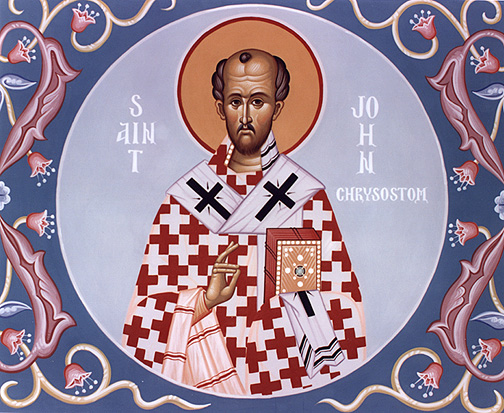Tag: Pascha
Friday Frivolity: By Death He trampled death…

Easter Sunday
![]()
Happy Pascha
 Every year on Easter/Pascha Day in the Byzantine Church, we hear the the Pascal Homily of St. John Chrysostom. Since we’re nearing the end of the Easter season I thought now would be a good time to share it:
Every year on Easter/Pascha Day in the Byzantine Church, we hear the the Pascal Homily of St. John Chrysostom. Since we’re nearing the end of the Easter season I thought now would be a good time to share it:
If any man be devout and love God, let him enjoy this fair and radiant triumphal feast. If any man be a wise servant, let him rejoicing enter into the joy of his Lord.
If any have labored long in fasting, let him now receive his recompense. If any have wrought from the first hour, let him today receive his just reward.
If any have come at the third hour,let him with thankfulness keep the feast. If any have arrived at the sixth hour, let him have no misgivings; because he shall in nowise be deprived therefor.If any have delayed until the ninth hour, let him draw near, fearing nothing.
If any have tarried even until the eleventh hour, let him, also, be not alarmed at his tardiness;for the Lord, who is jealous of his honor, will accept the last even as the first; he gives rest unto him who comes at the eleventh hour, even as unto him who has wrought from the first hour.
And he shows mercy upon the last, and cares for the first; and to the one he gives, and upon the other he bestows gifts. And he both accepts the deeds, and welcomes the intention, and honors the acts and praises the offering.
Wherefore, enter you all into the joy of your Lord; and receive your reward, both the first, and likewise the second. You rich and poor together, hold high festival. You sober and you heedless, honor the day. Rejoice today, both you who have fasted and you who have disregarded the fast. The table is full-laden; feast ye all sumptuously.
The calf is fatted; let no one go hungry away. Enjoy ye all the feast of faith: Receive ye all the riches of loving-kindness. let no one bewail his poverty, for the universal kingdom has been revealed. Let no one weep for his iniquities, for pardon has shown forth from the grave.Let no one fear death, for the Savior’s death has set us free. He that was held prisoner of it has annihilated it. By descending into Hell, He made Hell captive.
He embittered it when it tasted of His flesh. And Isaiah, foretelling this, did cry: Hell, said he, was embittered, when it encountered Thee in the lower regions. It was embittered, for it was abolished. It was embittered, for it was mocked. It was embittered, for it was slain. It was embittered, for it was overthrown. It was embittered, for it was fettered in chains. It took a body, and met God face to face.It took earth, and encountered Heaven. It took that which was seen, and fell upon the unseen.
O Death, where is your sting? O Hell, where is your victory? Christ is risen, and you are overthrown. Christ is risen, and the demons are fallen. Christ is risen, and the angels rejoice.Christ is risen, and life reigns. Christ is risen, and not one dead remains in the grave. For Christ, being risen from the dead, is become the first fruits of those who have fallen asleep.
To Him be glory and dominion unto ages of ages. Amen.
Easter: The Pagan Conspiracy
 I meant to write this post in the weeks leading up to last Easter, but I’m afraid it completely slipped my mind. Unfortunately, this meant that when Easter Sunday rolled around and all the “Easter is a pagan festival!” comments started to appear on Facebook and on blogs, I was repeatedly forced to write some off-the-cuff comments in response, rather than having something prepared here to which I could link.
I meant to write this post in the weeks leading up to last Easter, but I’m afraid it completely slipped my mind. Unfortunately, this meant that when Easter Sunday rolled around and all the “Easter is a pagan festival!” comments started to appear on Facebook and on blogs, I was repeatedly forced to write some off-the-cuff comments in response, rather than having something prepared here to which I could link.
I was reminded that I had intended to do this post a couple of days ago while reading an article in the Telegraph. The article in question was talking about how the Church of England has plans to create a new Pagan church to attract new people . Inter-faith dialog is one thing, but this sounds like something quite different. I’m intrigued as to what this’ll end up looking like. We’ll just have to wait and see…
So, I know Easter Sunday has long since passed. In fact, Pentecost has also been and gone and we’re even nearing the end of the Apostles’ Fast. However, I’ve decided to write a quick blog entry here in preparation for next year so that when we’re in the run up to Easter I’ll be ready
A festival by any other name…
The main thrust of most the comments I saw this year was over the word “Easter” itself. It was pointed out, ad nauseam, that the word “Easter” is most likely etymologically related to the word “Eostre”, a Germanic deity from paganism. The “logic” goes that, since the word “Easter” has pagan roots, the celebration itself must also be pagan. Makes sense, right? Err….no.
I’ll admit that when I see such comments I get a little irritated because I don’t think they’ve really thought through what it is that they’re saying nor have they applied their position consistently.
Husbands, *love* your wives
Before we leave the Easter season, I wanted to share with you something that stood out for me during the last days of Lent leading up to Easter Sunday. It was a slightly odd thing for me, being that it was the subject of marriage….


How did I manage to get to the subject of “marriage” from the Easter celebrations? Well, what was running through my mind throughout the Easter liturgy was the last part of Paul’s Letter to the Ephesians:
“Submit to one another out of reverence for Christ.
“Wives, submit yourselves to your own husbands as you do to the Lord. For the husband is the head of the wife as Christ is the head of the church, his body, of which he is the Savior. Now as the church submits to Christ, so also wives should submit to their husbands in everything.
“Husbands, love your wives, just as Christ loved the church and gave himself up for her to make her holy, cleansing her by the washing with water through the word, and to present her to himself as a radiant church, without stain or wrinkle or any other blemish, but holy and blameless.” – Ephesians 5:21-27
Now, without a doubt, this is a passage that has been abused over the years. It has certainly been used for the subjugation of women and the preservation of tyrannical husbands. In response to this, many have rejected the entire passage out of hand. I don’t think either of these two positions is acceptable, since both reactions ignore the passage’s context and miss the important imagery being used by Paul.
